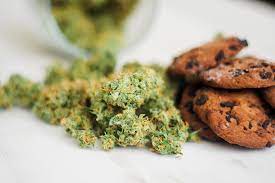Definition
Munchies refer to the intense craving for food, particularly snacks or comfort foods, often experienced after consuming cannabis. This phenomenon is caused by the interaction of cannabinoids, primarily THC, with the brain’s appetite-regulating systems.
Purpose and Usage
The munchies are commonly enjoyed by recreational cannabis users as a fun and indulgent side effect, enhancing the enjoyment of food. Medically, this effect is significant for individuals experiencing appetite loss due to conditions like chemotherapy, HIV/AIDS, or eating disorders.
How It Relates to Cannabis
- Mechanism:
- THC interacts with the endocannabinoid system, particularly CB1 receptors, stimulating appetite.
- Increases the sensitivity of taste and smell, making food more appealing.
- Releases dopamine, enhancing the pleasure derived from eating.
- Cannabis Strains:
- Strains high in THC, like Blue Dream or OG Kush, are more likely to induce munchies.
- CBD-dominant strains typically do not produce the same appetite-stimulating effect.
- Common Foods:
- Sweet, salty, and savory snacks like chips, chocolate, or pizza are often craved.
- Fresh fruits and other flavorful foods may also be more enjoyable.
Common Misconceptions
Many believe that the munchies are a universal side effect of cannabis, but some individuals may not experience this reaction. Another misconception is that all cannabis strains cause munchies, though the effect varies based on the strain and individual tolerance. Additionally, some think the munchies lead to overeating, but users can manage their food intake with mindful choices.
Alternatives
- Non-THC Appetite Stimulants: Prescription medications designed to increase appetite in medical contexts.
- CBD-Dominant Strains: Offer therapeutic benefits without inducing munchies, suitable for individuals avoiding appetite stimulation.
Importance of Munchies
Munchies are a well-known and often celebrated aspect of cannabis culture, enhancing the sensory enjoyment of food. Beyond recreational use, this effect has significant therapeutic value, providing a natural way to address appetite loss in medical treatments. Understanding the munchies helps users tailor their cannabis experiences to their preferences and needs.






